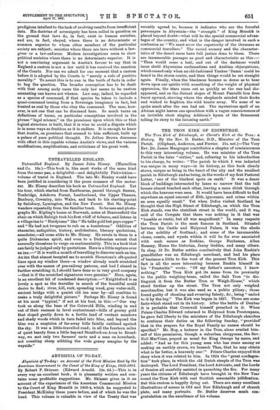ITNTRATELLED ENGLAND.
Untravelled England. By James John Hissey. (Macmillan and Co. 16s.)—This book is, like most storks of the same kind from the same pen, a delightful—and delightfully Pickwickian- volume of travel in England. The late Mr. Henley would have been justified in considering it the prose romance of the motor- car. Mr. Hissey describes his book as Untrave/led England. Yet his tour, which started from Eastbourne, passed through Sussex, Tonbridge, Ashdown Forest, Leatherhead, the Upper Thames, Banbury, Coventry, into Wales, and back to his starting-point by Salisbury, Lymington, and the New Forest. But Mr. Hissey wanders repeatedly from the familiar track. So he sees and photo- graphs Mr. Kipling's house at Burwash, notes at Beaconsfield the chair on which Raleigh took his first whiff of tobacco, and listens in a village ism to " Hardyisms" like " He talks gold but pays copper" and "He had not twopence to rub on a tombstone." Oddities of character, antiquities, history, architecture, literary quotations, anecdotes,—all come alike to Mr. Hissey. He revels in them in a quite Dickensian spirit, and even to a Dickensian extent that assuredly threatens to verge on sentimentality. This is a book that can fairly be judged only by quotations. Here is a little rapture over an inn :—"It is worth a month of travelling to discover such an inn. An inn that almost tempted me to scratch Shenstone's oft-quoted lines upon my window there—a window already much scratched over with the names of pre-railway patrons, and had I sinned in further scratching it, I should have done so in very good company —that is if the scratched signatures were genuine." Here, again, is an excellent bit of condensed description :—" Knightsford is as lovely a spot as the traveller in search of the beautiful could desire to find; river, hill, rook, spreading wood, grey water-mill, ancient bridge with a quaint old inn near by—all combine to make a truly delightful picture." Perhaps Mr. Hissey is found at his most "typical," if not at his best, in this :—" Oar way took us along the base of the Cotswold Hills, winding in and out of their recesses in level contentment—hills of greeny gold that sloped gently down to a fertile land of verdant meadows and shady woods which in turn faded into blue, and beyond the blue was a suspicion of far-away hills faintly outlined against the sky. It was a little-travelled road; in all the fourteen miles of quiet beauty from a little beyond Stratford-on-Avon to Broad- way, we met only two farmers' carts and a man on horseback, not counting sheep nibbling the wide grassy margins by the wayside."


























































 Previous page
Previous page